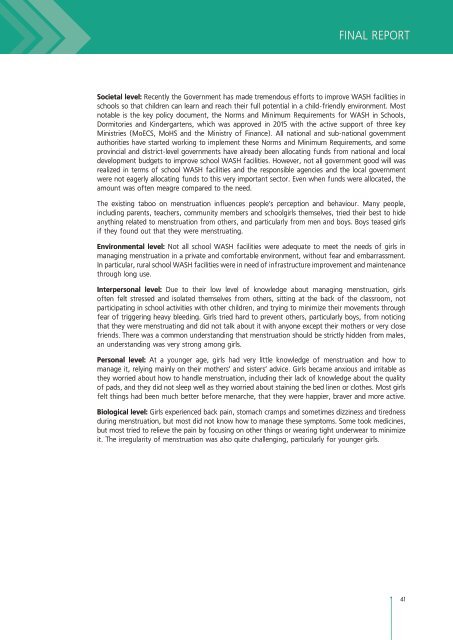FINAL REPORT
2m408P0
2m408P0
Create successful ePaper yourself
Turn your PDF publications into a flip-book with our unique Google optimized e-Paper software.
<strong>FINAL</strong> <strong>REPORT</strong><br />
Societal level: Recently the Government has made tremendous efforts to improve WASH facilities in<br />
schools so that children can learn and reach their full potential in a child-friendly environment. Most<br />
notable is the key policy document, the Norms and Minimum Requirements for WASH in Schools,<br />
Dormitories and Kindergartens, which was approved in 2015 with the active support of three key<br />
Ministries (MoECS, MoHS and the Ministry of Finance). All national and sub-national government<br />
authorities have started working to implement these Norms and Minimum Requirements, and some<br />
provincial and district-level governments have already been allocating funds from national and local<br />
development budgets to improve school WASH facilities. However, not all government good will was<br />
realized in terms of school WASH facilities and the responsible agencies and the local government<br />
were not eagerly allocating funds to this very important sector. Even when funds were allocated, the<br />
amount was often meagre compared to the need.<br />
The existing taboo on menstruation influences people’s perception and behaviour. Many people,<br />
including parents, teachers, community members and schoolgirls themselves, tried their best to hide<br />
anything related to menstruation from others, and particularly from men and boys. Boys teased girls<br />
if they found out that they were menstruating.<br />
Environmental level: Not all school WASH facilities were adequate to meet the needs of girls in<br />
managing menstruation in a private and comfortable environment, without fear and embarrassment.<br />
In particular, rural school WASH facilities were in need of infrastructure improvement and maintenance<br />
through long use.<br />
Interpersonal level: Due to their low level of knowledge about managing menstruation, girls<br />
often felt stressed and isolated themselves from others, sitting at the back of the classroom, not<br />
participating in school activities with other children, and trying to minimize their movements through<br />
fear of triggering heavy bleeding. Girls tried hard to prevent others, particularly boys, from noticing<br />
that they were menstruating and did not talk about it with anyone except their mothers or very close<br />
friends. There was a common understanding that menstruation should be strictly hidden from males,<br />
an understanding was very strong among girls.<br />
Personal level: At a younger age, girls had very little knowledge of menstruation and how to<br />
manage it, relying mainly on their mothers’ and sisters’ advice. Girls became anxious and irritable as<br />
they worried about how to handle menstruation, including their lack of knowledge about the quality<br />
of pads, and they did not sleep well as they worried about staining the bed linen or clothes. Most girls<br />
felt things had been much better before menarche, that they were happier, braver and more active.<br />
Biological level: Girls experienced back pain, stomach cramps and sometimes dizziness and tiredness<br />
during menstruation, but most did not know how to manage these symptoms. Some took medicines,<br />
but most tried to relieve the pain by focusing on other things or wearing tight underwear to minimize<br />
it. The irregularity of menstruation was also quite challenging, particularly for younger girls.<br />
41



